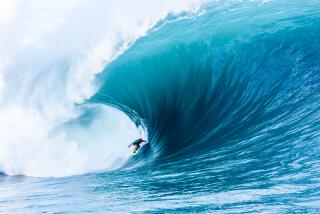Live and Learn
- Share via
Julia Christian enjoyed her finest moment in the sun last December, after coming up with the perfect plan to upset some of the world’s best female surfers in the Turtle Bay Resort Women’s Pro on Oahu’s North Shore. And then executing the plan to perfection and winning.
Or so anyone else in a similar situation might have you believe.
Not Christian, 21, the former star of the Carlsbad High surf team, whose candor and spirit are as refreshing as the Hawaiian trade winds.
“It was a total surprise to me,” she confessed recently. “I didn’t know I needed first or second in that contest to qualify. I just surfed the whole day, not even knowing. I was clueless. I was pretty much shocked when I found out. It was crazy.”
With the victory, the first for a California woman on the North Shore since Alisa Cairns at the same break in 1996, Christian qualified for the 2003 World Championship Tour.
The WCT, as it is called, is the top tier for Assn. of Surfing Professionals athletes. It takes only the top 16 in the world, plus up to two wild-card entries.
Not since Kim Mearig in 1982 had a California surfer qualified for the WCT, and not since Lisa Andersen in 1986 had a woman from the U.S. mainland ascended to such a plateau.
Christian, once all this had settled in, was elated.
“This is my fourth year surfing in Hawaii and I’ve never made it past the quarterfinals,” she told reporters afterward. “I was just hoping to do a little better -- I wasn’t planning on winning.”
But what’s really crazy, she has since found out, is how difficult life is on the WCT.
The level of competition is much stronger than it is on the World Qualifying Series tour, where surfers compete for points in hopes of advancing to the WCT.
The WCT features longer, two-person heats as opposed to four-person heats, and a priority system that demands more strategy by the athletes.
The judges are more critical, so a ride that would score well on the WQS doesn’t always score well on the WCT. Rookies are often unfamiliar with the contest venues, and given that the surfers pay for their own travel out of whatever sponsorship money they earn, arriving early to acclimate is not always possible.
Plus, there are only six WCT events, so every wave counts hugely toward one’s chances of automatically requalifying for the next year. The top 10 at year’s end requalify and the other six berths are filled by surfers atop WQS standings.
Christian, a high school honor student who decided to pursue a career as a pro surfer instead of going to college, would not go so far as to say she has been overwhelmed. But she did acknowledge that she’s having trouble adjusting, and that jittery nerves have played a large part in her early struggles.
Through three events, she’s in a last-place tie with Prue Jeffries of Australia. Her best finish was ninth in the season-opening Roxy Pro along Australia’s Gold Coast. In the other contests, in Fiji and Tahiti, she finished last.
Looking on the bright side, she said, “I have nowhere to go but up, and up.”
*
Few people, including executives with the international surf-wear company Rip Curl, which in March signed Christian to a three-year sponsorship deal, are counting Christian out just yet.
“It takes a year or two to settle in so we don’t have any overly high expectations in the first little bit,” said Adam Sharp, vice president of marketing for Rip Curl USA in Carlsbad. “When we signed her, we saw an overall package. She’s an exciting face for women’s surfing. She’s an excellent role model and a fantastic competitive surfer and a great ambassador for the sport.”
Christian, who learned to surf with her two older brothers, has always been somewhat shy out of the water but fiercely competitive on a surfboard.
“She doesn’t have the radical maneuvers other surfers have -- she’s more controlled and smooth,” said Holly Beck, 22, who has competed against Christian since she was on the surf team at Rolling Hills Estates Peninsula High. “We started surfing at the same time, but she was always just a little better. Of course, I wanted to beat her, but it was a very friendly rivalry. She’s always happy, joking, and everyone respects her. In a very competitive environment, she never has anything negative to say.”
Beck, who delayed her surfing career to earn a college degree in psychology, is now aspiring “to follow in Julia’s footsteps” and qualify for next year’s WCT. She ranks 12th on the WQS.
Christian, meanwhile, is determined to stay put. In addition to the WCT events, she’s competing in all WQS events rated four-star or higher, plus smaller contests closer to home, hoping to build points she might need at season’s end.
With a long break between contests -- the next WCT event is the Portugal Pro on Sept. 19-28 at Figueira da Foz -- she has traveled to Peru to train with her coach, Magoo de la Rosa, 37, a widely known surfer in Latin America.
Reached by phone, De la Rosa said he was trying to make Christian “more explosive” by lowering her center of gravity, while at the same time trying to instill the confidence she will need “in order to beat people that have a lot more experience than her.”
Up next for Christian is a four-star WQS event in South Africa, then she returns home for the one-star Globe Gallaz Pro on July 16-20 in Oceanside and the six-star Honda Element U.S. Open of Surfing on July 26-Aug. 3 in Huntington Beach.
Getting paid to surf for a living and traveling to exotic lands, Christian said, are what attracted her to the life she’s living. But, she said, money doesn’t exactly pour out of the sponsors’ pockets, and life on the tour isn’t all that luxurious.
During the contest earlier this year in Tahiti, for example, minuscule bungalows went for $270 a night, so Christian, Sophia Mulanovich of Peru, Chelsea Georgeson of Australia and Megan Abubo of Hawaii shared what was billed as a bungalow for four.
“It was just one small room with two sets of bunk beds,” Christian said. “We couldn’t even fit all of our stuff inside. There were no screens on the windows and we only had two mosquito nets, so we ended up sharing two beds because nobody wanted to sleep without mosquito netting.”
On Hawaii’s remote North Shore, housing is limited, and sleeping space is at a premium.
“When you’re the youngest, you’re on the floor -- period,” Christian said, recalling her first experiences as a pro, fresh out of high school. “You can’t even argue for a bed.”
In South Africa, she and her mother -- who served as chaperon in the early stages of her career -- were once put in shared housing “with two transsexuals who even told us they had the operations.”
During another contest in South Africa, Christian and two tour mates were walking through a bad neighborhood to a grocery store “and this guy pops out of this alleyway and he has his head completely split open, with blood all over him. And we were just, ‘OOhhh!,’ running away from him.”
Reminded that she’d be returning to that neighborhood for her next contest in early July, she reported that in this case she really had come up with the perfect plan.
“Me, Jenny [Boggis, a competitor from Australia] and Holly are staying in the same hotel,” Christian announced. “We’re all going to hide in there.”
More to Read
Go beyond the scoreboard
Get the latest on L.A.'s teams in the daily Sports Report newsletter.
You may occasionally receive promotional content from the Los Angeles Times.










